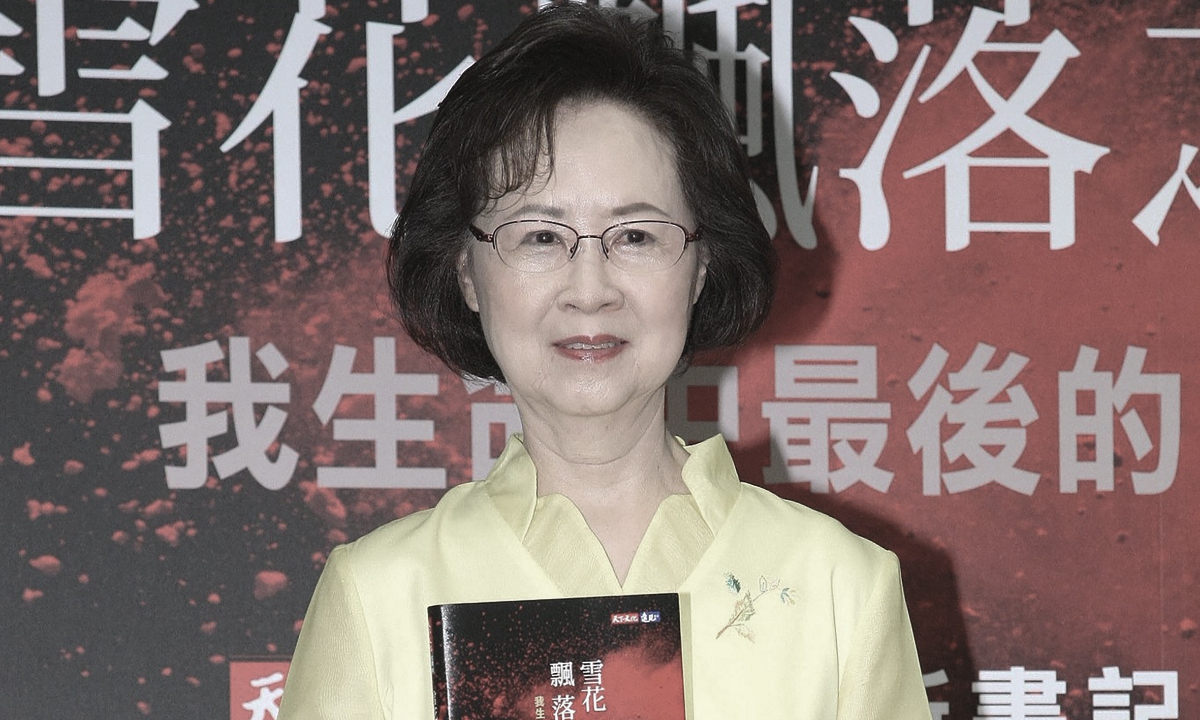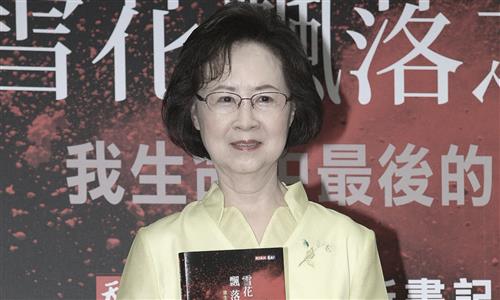
Renowned author and producer Chiung Yao Photo: VCG
The news of renowned writer Qiong Yao's passing at her home in the Taiwan region on Wednesday has quickly spread across the Chinese-speaking world in the past two days. Although her family announced on Thursday that no media events or memorial services would be held, generations across the Taiwan Straits have found their own ways to mourn her. For a writer, this is the highest form of recognition and remembrance.The Chinese people have a natural love for literature. In terms of popular literature, in the past there was a saying that "Where there are wells with water, the poems of Liu Yong (a Chinese poet of Song Dynasty) can be heard," and later, it was said that "Wherever there are Chinese people, there are readers of Jin Yong (a martial arts novelist)." Since the 1980s, several generations on both sides of the Taiwan Straits have been influenced by Qiong Yao. Even those who have not read her novels know her name or can hum a few lines such as, "There will be no fragrant plum blossoms without freezing cold weather" or "Let us journey through the world together, living freely and joyfully."
Half a century of writing, 61 literary works, 51 adapted films, and 25 adapted TV series - Qiong Yao's ability to resonate so deeply within the Chinese-speaking world and become a shared cultural memory across the Taiwan Straits and the broader Chinese community lies in her works' deep roots in the rich soil of Chinese culture. Her stories are imbued with the aesthetics and emotions of the Chinese people.
The life of Qiong Yao has undergone the changes of a significant era. She has the most direct and profound feelings about the separation between the two sides of the Taiwan Straits. From Qiong Yao, we can see the deep sense of patriotism and attachment to the homeland that exists among the Taiwan compatriots. She once recounted that her sense of national and ethnic identity was "forged under the barrel of gun." During the turmoil of the Japanese invasion of China, she witnessed the fall of the nation and the suffering of the people.
Therefore, she dedicated her life to promoting cultural exchanges and mutual understanding between the two sides of the Taiwan Straits. She stated that Chinese people love their ancestors, their land, their hometowns, and their homes, so they left eternal poems such as "Gazing at the same moon, scattered loved ones weep. The longing for home, in five places, runs deep." In 1987, when Taiwan authorities allowed family visits to the mainland, Qiong Yao immediately submitted her application with "a joy that was beyond words," returning to the mainland after a 39-year absence. "Tonight, I sit by the Yangtze River, yet I fear the Yangtze is just a dream," wrote Qiong Yao.
If Qiong Yao's "unbreakable nostalgia" stems from separation, then her writing possesses a strong sense of belonging. Chinese culture itself is rooted in the homeland, and Qiong Yao has always cultivated her connection to it. From a cultural perspective, she has never truly "departed." She was introduced to classical literature at the age of six and could recite famous Tang and Song poems by the age of seven. Her solid foundation in classical Chinese literature has endowed her literary life with soul. "Qiong Yao's works are steeped in a Chinese way of life and the warmth of human relationships." The "Qiong Yao phenomenon" that swept across both sides of the Taiwan Straits was driven primarily by a profound sense of cultural resonance among the Chinese people.
In recent years, the Democratic Progressive Party (DPP) has implemented many practices in the cultural sector on the island aimed at "de-Sinicization." Essentially, this is an attempt to use "soft Taiwan independence" to sever the ties between Taiwan and the mainland, given that "de jure independence" is not achievable. In response to this, Qiong Yao cried out, "Since when did the Yangtze River, Yellow River, Qinghai, Great Wall, and Himalayas cease to be our pride? Since when did the Tang, Song, Yuan, and Ming dynasties stop being our history?"
The DPP authorities' regressive actions cannot shake the Yangtze and Yellow Rivers. The imprint of Chinese culture on Taiwan society cannot be erased, and the sense of Chinese national identity among the Taiwan compatriots cannot be diminished. Qiong Yao's legendary life and her influence across the Taiwan Straits serve as powerful proof of this.
"My nostalgia is not tied to any specific point on the mainland, but rather to the entire land of the mainland," which reflects the sentiment of the "wanderers" of Qiong Yao's generation. For them, past nostalgia was marked by a shattered homeland drifting like catkins in the wind, while today's nostalgia is a merely a river apart, yet feels like a world away.
However, anyone who takes a look at the strong cultural ties shared across the Straits can easily understand that Taiwan's eventual return to the embrace of the motherland is inevitable. "In the blood of the Chinese people flows continuously a Yellow River, a Yangtze River!" Though Qiong Yao has now "gracefully" departed, her words, filled with profound love, merge into the Yellow River and Yangtze River of Chinese culture, becoming part of the shared spiritual home of compatriots on both sides of the Straits. In this sense, as Qiong Yao once said, she has not lived this life in vain.


